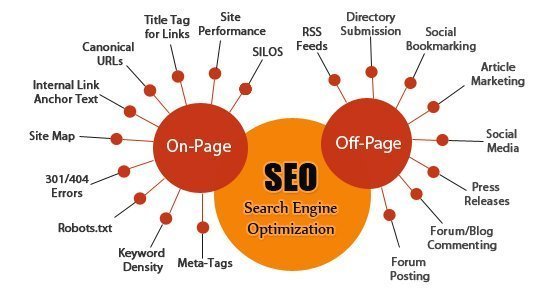
70.6% of all traffic originates from a search engine. On any given day, there are 5.6 billion searches made on Google. When you search for something in Google (or any other search engine), an algorithm works in real-time to deliver you what that search engine recognizes the “best” result. Most searchers pick only the results from the first page of the search engine, and getting a hold of these searchers means a lot to your business. So, the main goal of online marketers is to be noticed and be at the top of the rankings in the search results. The question is, how? For your website to be on the top spot, you need just the right online marketing strategy- SEO.
Defining SEO

SEO stands for Search Engine Optimization, and it explains the logic behind the ranking of websites when you perform a search on any search engine. It is a process of increasing the quantity and quality of traffic to your website through free or organic search engine results. To drive traffic to your website and generate leads and conversions, one must fully understand how vital SEO is to all marketing efforts. Understanding the best practices to optimize your content and site is essential if you plan to compete for traffic. People that know all about search engine optimization are highly sought after because the return on investment they bring is immense. SEO is quite a challenge for it has an evolving nature that requires marketers to read up on new algorithm changes continuously. With a little SEO knowledge under your belt, you can be on your way to developing your brand’s search engine ranking in no time.
Though search engine optimization can get pretty complex when it comes to all the different factors that influence your ranking, the basic process is not as complicated to learn.
Understanding how SEO works

To better understand SEO, you must learn how search engines work.
- Search engines have a team of robots known as crawlers that go out and collects information about all the content they can get on the Internet. This discovery process of obtaining fresh and updated content is called Crawling. Also, the search engines will scan the site to determine how easy it is to operate and read, rewarding user-friendly sites with higher rankings on the search engine results page.
- The crawlers then bring all those data back to the search engine to build an index. That index is then served through an algorithm that tries to suit all that data with your search. This process is also known as Indexing.
- When someone performs a search, search engines seek their index for the most relevant content and then commands that content in the hopes of solving the searcher’s query. This ordering of search results by relevance is identified as Ranking. In general, you can assume that the more relevant the search engine believes that site is to the query, the higher a website is ranked.
We only see actual search results halfway down the first page. Then, even ads and more related search terms. What it comes down is this: search engines suppress organic results
from search. Although Google still displays 10 organic results per page, they are designed to induce attention to ads, answer boxes, “People also ask” sections and other widgets.
Let’s take a look at some of the factors that can impact your search engine optimization ranking. Even if search engines never give away the exact algorithm they use to rank sites, we do have a pretty good understanding of some of the factors that affect search engine results page (SERP) rankings.
-
Domain Authority
Authority is just like it sounds, it is search engines’ way of determining if the content is accurate and trustworthy. Domain Authority (DA) is a scale that shows how much trust your domain has established over time by a matter of backlinks and age. The older your domain, the higher its domain authority. How does Google know if a page is authoritative? They look at the number of other pages that link to that page. For higher ranks, a page must have many links.
-
Relevant and Optimized Content
To attract links, you need relevant content, but your content needs links to increase your site’s ranking in search results and to help drive traffic to a content piece. If you want to be on the first page of the search results, you need links to your content. Links and contents are what makes SEO a complete picture.
-
Keywords
It all starts with the right keywords. You can verify keywords in Google’s Keyword Planner or Ahrefs. Pick medium to low competition keywords and then slowly develop posts to target more competitive terms. Always remember to include the synonyms to your keyword aka LSI keywords.
-
Usefulness
If the content is relevant and authoritative but not useful, some search engines don’t want to position that content at the peak of the search results. In particular, Google has publicly said that there’s a distinction between “higher quality content” and “useful” content. Google’s basis for usefulness is on “User Experience Signals.” It is how users interact with the search results. If Google notices that people really like a specific search result, it will get a significant ranking boost.
-
Website Loading Speed
Your website’s loading speed is really a big basis for both the search engine and the searcher. Google truly cares about how quickly your site loads. To speed up your site you can use caching plugins or CDN to deliver your content much faster.
-
Structure of URL
Numerous studies have proved that the shorter the URL, the better. Nonetheless, you still want to make sure you are including your top keyword in the slug for an added SEO juice. It better for both the searcher and the search engine.
-
Clean and Responsive Design
The best, optimized websites are the ones that are clean, functional and responsive to any type of device. In fact, Google even favors websites that have mobile-friendly design than ones that don’t have.
In Summary
As we’ve discussed, there’s a lot to discover about search engine optimization. But considering how much targeted traffic SEO can bring, it’s totally worth the time and effort. And once you feel like you’ve understood the basics mastered the fundamental principles, start looking into more advanced stuff.







